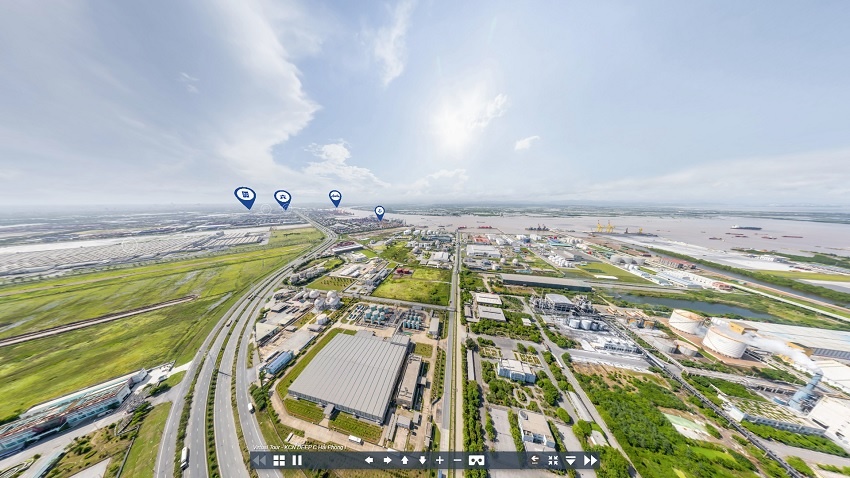Domestic suppliers backing up foreign manufacturers
 |
| DEEP C Industrial Park |
Late last month, Taiwanese laptop maker Compal Electronics organised a field trip to WHA Industrial Zone 1 in the central province of Nghe An, as well as DEEP C Industrial Park in the northern province of Quang Ninh, to explore the possibility of expanding operations in Vietnam.
Compal’s new plan follows its first production base in the northern province of Vinh Phuc which launched in May 2021. The move by Compal, a Fortune 500 company, is expected to help encourage more opportunities for electronic component manufacturers to become its vendors.
Moves like this in electronic component production come thanks to the shifting of global technology groups from China to Southeast Asian countries, including Vietnam. According to a survey over US businesses by the American Chamber of Commerce in China released in May, if COVID-19 controls persist for the next year, more than half of respondents said they would reduce investment in China.
Duong Nguyen Binh, vice president of the Vietnam Automation Association, said that investors from Europe, the United States, and Japan such as Arevo, Fujikura Fiber Optics, Mabuchi Motor, Premo, and Lixil are looking for feedstocks and intermediate goods in Vietnam to reduce costs and minimise risks as the pandemic continues to disrupt global supply chains. “Foreign technology groups have sought more than 400 types of components from local suppliers for industries such as electricity, electronics, mechanical engineering, precision mechanics, 3D printing, robotics, and automation, among others,” Binh said.
Meanwhile, domestic electronic component manufacturers are making efforts to expand their operations. Haast Industry Vietnam Co., Ltd. is accelerating the construction of its second and third production bases to serve increasing orders from partners. According to the plan, the second facility’s construction is expected to finish in late 2022 and the third next year.
Ngo Huu Tiep, chairman of Giza Group, the parent company of Haast Industry Vietnam, said, “The group established the first production facility following suggestions by foreign-invested partners.
After three years, we received many orders from other partners and see that the room for this segment is large, especially as global tech groups shift from China to other countries in Southeast Asia.”
Haast Industry is one of 14 domestic suppliers being supported via the smart factory of Samsung in collaboration with the Ministry of Industry and Trade (MoIT).
“After the training course, we are confident of becoming a second-tier vendor of Samsung and, for the long term, the company targets to be a first-tier vendor. If local suppliers can improve the competition capacity, the opportunity to join the global supply chain opens up,” Tiep said.
Along with selecting available suppliers, foreign tech groups are willing to train domestic vendors to help them to improve their productivity and capacity. In mid-June, Toyota Motor Vietnam and the Vietnam Industry Agency under the MoIT signed an MoU to renew a project to enhance domestic supporting industries.
Hiroyuki Ueda, president of Toyota Vietnam, said, “Domestic part suppliers face difficulty in competing with foreign vendors and importing goods due to lack of experience and production capacity. The production cost for parts and components in Vietnam is either double or triple compared to the costs in surrounding countries. Through this project, we hope to further contribute to improving suppliers’ capability and expand the local supplier network.”
It is the third year Toyota Vietnam and the agency have worked on the project, which is implemented on an annual basis. By joining the project, potential suppliers of automotive parts and components will have the opportunity to connect with automobile assemblers and manufacturers in the country and visit the Toyota Vietnam factory and its domestic suppliers. Besides that, they are supported for participation in training under local supplier development programmes.
Since the MoU was clinched, they have been carrying out a new operational support programme for some suppliers, in which Toyota will send experts to work periodically at their facilities, thereby helping to improve operational efficiency.
Statistics by the General Department of Customs show that in the first half of this year, Vietnam spent $39.62 billion on imported computers, electronic parts, and components – a rise of $9 billion or 29.3 per cent on-year, thus making up the largest group in import turnover in the period, accounting for 23.36 per cent of the country’s total import value.n
What the stars mean:
★ Poor ★ ★ Promising ★★★ Good ★★★★ Very good ★★★★★ Exceptional
 Tag:
Tag:
Related Contents
Latest News
More News
- SK Innovation-led consortium wins $2.3 billion LNG project in Nghe An (February 25, 2026 | 07:56)
- THACO opens $70 million manufacturing complex in Danang (February 25, 2026 | 07:54)
- Phu Quoc International Airport expansion approved to meet rising demand (February 24, 2026 | 10:00)
- Bac Giang International Logistics Centre faces land clearance barrier (February 24, 2026 | 08:00)
- Bright prospects abound in European investment (February 19, 2026 | 20:27)
- Internal strengths attest to commitment to progress (February 19, 2026 | 20:13)
- Vietnam, New Zealand seek level-up in ties (February 19, 2026 | 18:06)
- Untapped potential in relations with Indonesia (February 19, 2026 | 17:56)
- German strengths match Vietnamese aspirations (February 19, 2026 | 17:40)
- Kim Long Motor and AOJ Suzhou enter strategic partnership (February 16, 2026 | 13:27)






















 Mobile Version
Mobile Version